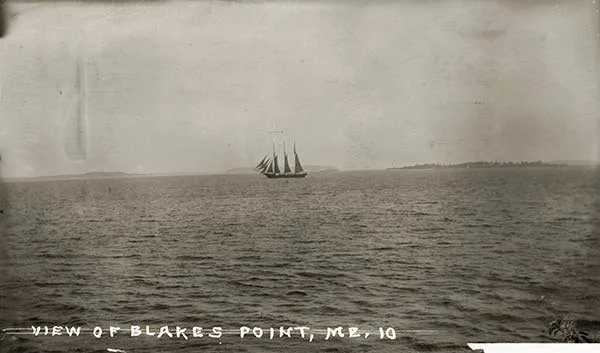Brooksville Maritime History
Excerpted from the Introduction in Maritime History of Brooksville,
by LeCain Smith, published by the Brooksville Historical Society 2005
Looking around this almost-an-island community of Brooksville today, you would have little idea of the extent of maritime activity or, for that matter, any other industry that existed here over a century ago. Except for remains of wooden and stone wharfs, pieces of shipwrecks, overgrown foundations, crumbling evidence of quarries and mines, and barely recognizable roadways leading into the woods, it looks like little ever went on here.
This community was in its heyday in the nineteenth century-the population was about double what it is today. Maine was the shipbuilding capital of the world, and the small town of Brooksville did its share. Roads were few and railways nonexistent, so trade was carried out by sea, and Brooksville mariners could be found in ports all over the world. And those left behind on land produced the trade goods that the vessels carried.
Although Brooksville shipwrights never produced the sheer numbers of ships as some other towns, supported by local caulkers, sailmakers, metal smiths, and rope workers, they turned out sturdy, well found vessels that took their rightful places on the oceans of the world. But Brooksville men (and even some women) bowed to no one when it came to sailing these ships, whether Brooksville-built or not; the number of captains or crew home-ported in Brooksville is quite high in relation to the total population of the town. Many young lads excelled rapidly at an early age to become masters of tall ships that circled the globe, visiting exotic ports in far away lands. Others took loads to Boston and east coast ports, and many worked the local waters. Brooksville mariners developed notable seamanship skills and were hired onto ships traveling all over the world, working as seamen, cooks, stewards, engineers, bosuns, and mates. Merchants based ashore provided these products. Certain commodities readily available here were highly valued as construction materials. Since the time of the early settlers, tall Maine trees were coveted by the King of England as spars for naval vessels. Lumber and wood products were in demand around the world. Bagaduce clay was perfect for bricks, and brickyards soon flourished. Quality stone, such as our local granite, was prized, and the quarry in South Brooksville at Kench's Mountain was one of many along the downeast coast of Maine represented in fine structures in the major cities of the world. Copper was shipped from Goose Falls in the late 1800's.
Other products and services were also provided by these resourceful and adaptable Main Yankees. Good drinking water could be loaded almost directly onto ships at Lem's Cove and Tom Cod Cove. Hay from the fields, shingles from the grist mills, and firewood from the forests were carried away to distant ports. Besides the fish that was abundant in those days, fish oil, bait fish, clams, cured fish, and eventually lobster were shipped all over. Pogie (menhaden) processing plants, herring canneries, fishing weirs (introduced much earlier by the Native Americans), bait businesses, and even creameries were found all over Maine, and Brooksville was well represented in these activities. Although the demand for beaver skins had passed, local sheep wool was of good quality and in demand; the wool-carding mill at Walker Pond did well for many years. Fresh farm produce was also shipped quite often to Boston and other large New England towns.
The shipping of fresh fish and produce, whether it originated from Brooksville or not, required ice and wood-chip or sawdust packing to keep the products in peak condition. The ice works by Walker Pond was a busy operation with large ships from all over coming to load up. This activity lasted until refrigeration arrived around 1916.
Even when the first tourists came, it was by coastal schooners and later by steamship. Most hotels and inns were built by the shore, so arrival and departure by sea was convenient. Visitors stayed longer in those days, so the inns did well all summer. The tourist industry helped to support local folks even in the nineteenth century, though its impact wasn't significant until the later part the century.
